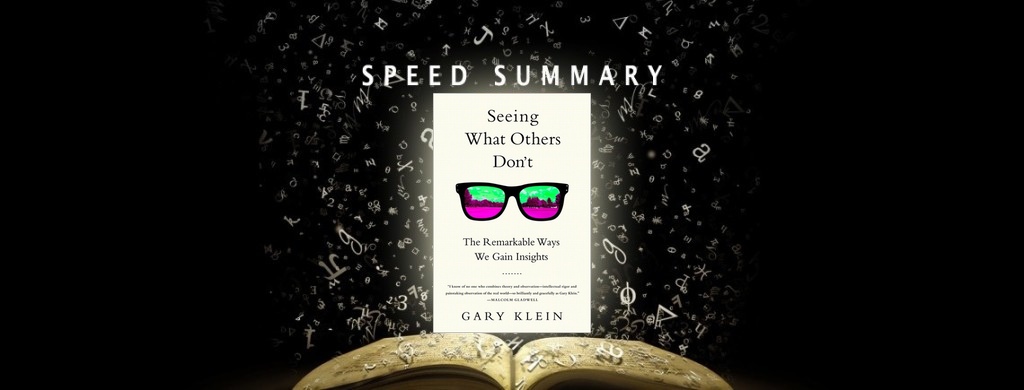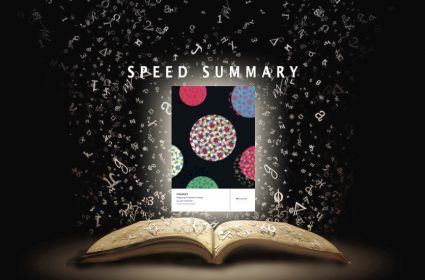Seeing What Others Don’t [Speed Summary]

- Seeing What Others Don’t – The Remarkable Ways We Gain Insights
- Author: Gary Klein
- Publisher: PublicAffairs
- Publication date: 2013
What is insight anyway?
Ever wanted to nail the definition of insight simply and clearly?
Eminent cognitive psychologist Dr Gary Klein, renowned for his work on how people make decisions in practice – rather than theory, has a simple and clear definition for you. In his latest book ‘Seeing What Others Don’t – The Remarkable Ways We Gain Insights’, Klein defines insight as
Insight: “an unexpected shift in the way we understand things”.
So when your client asks for insights – what they are really saying is ‘surprise me, tell me something that will change how I understand my market’.
That’s what you, I and other qualitative market researchers get paid for – we’re paid to see things that others don’t in order to shift how clients think about things. We’re paradigm shifters we share observations, interpretations and stories that shift understanding about how things work.
Performance Enhancement
Of course, agencies like to bolt on their own spin on insight; ‘our insight not only shifts understanding, it also helps you sell more stuff’ (for more, more often, to more people)…

For Klein too, good insights are insights that have impact, they not only change how we understand something, they also change how we perform or act. And if they are powerful insights, then they not only change understanding and performance, they also change how we feel and what we want. When insight impacts on all four areas – understanding, performance, feeling and desires – it’s a potential paradigm shifter.
How to Have Insights
Based on an investigation of 120 insights that shook the world, including those of Einstein, Darwin and Fleming – Klein outlines 3 ‘remarkable’ insight hunting techniques that can deliver paradigm-shifting understanding.
- Look for Connections – make connections between your client’s market and other markets – past or present; the Japanese understood how they could successfully attack Pearl Harbour not by studying Pearl Harbor but by looking at a Mediterranean battle between the Italians and the British. Out of the 120 insights investigated, Klein found making new connections were the source of 80% of them
- Look for Contradictions – look for inconsistencies in behaviour and beliefs in the market. Hedge fund managers John Paulson and Paolo Pellegrini called the financial meltdown in the late 90’s by spotting a contradiction between the beliefs of market experts (basic economic tenets and a belief in ever-rising house prices). Nearly 40% of insights investigated by Klein involved spotting contradictions – including Einstein’s understanding of the space-time continuum.
- Look for Creative Desperation – look at the market for acts of creative desperation; desperate brands that seem doomed but then suddenly do something that reverses their fortunes. By piggybacking on desperate but successful creative acts, you gain insight into the hidden workings of a market. Trapped firefighters famously learned to fight fire with fire by setting a new fire to create an escape route. If necessity is the mother of invention, then desperation is the father of insight.
In addition to these three ‘remarkable ways we gain insight’ – looking for connections, contradictions and successful acts of creative desperation – Klein suggests we might also look for coincidence and curiosities in a market. Physician Michael Gottlieb noticed coincidences in the types of symptoms that gay men began to present in the 1980s – it led to the discovery of AIDS. Alexander Fleming noticed the curious behaviour of bacteria near mould (it died), and that led to the discovery of penicillin. However, Klein cautions against looking for coincidences and curiosities as an insight hunting technique as they can be misleading and lead to dead ends. Only 10% of the insights he investigated were found by looking at coincidences and curiosities.
The BG Take
We love ‘Seeing What Others Don’t – The Remarkable Ways We Gain Insights‘ because it is insightful. Klein’s book has unexpectedly shifted our understanding of what insight is and how to hunt for it. We have a better understanding of what we’re looking for – performance-enhancing understanding – and how to hunt for it – with the three big remarkable insight hunting tools. Armed with this insight into insight, we’re better equipper to help clients sell more by changing how they understand their markets.

Whilst not a core theme of the book, we also like Klein’s explanation of why many clients actually don’t want insight – although that’s exactly what they say they want. Insight is challenging because it forces you to change the way you think, the way you act, the way you feel, and the goals you seek. That’s both risky and hard work. So it’s far easier to stick with the status quo – and focus performance-enhancing efforts on reducing errors in what you do. But to optimise brand performance, we think both are necessary – error reduction and insight generation.




